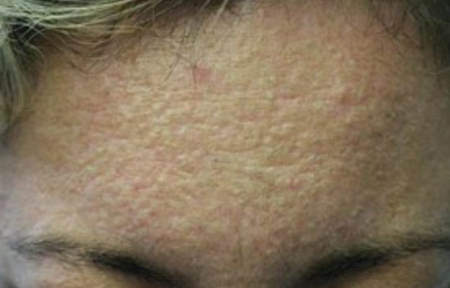Acne: Who gets and causes
Family history with acne
If one of your parents or another close blood relative had deep, painful pimples, you have a greater risk of developing this type of acne.

What causes acne?
Acne develops when pores become clogged. What type of acne you get depends on what clogs your pores. You’ll find pictures of the different types of acne, along with a description of how each type of blemish forms at: Acne: Signs and symptoms
While scientists are still trying to figure out why some people skin seems more likely to develop acne, it’s likely that hormones play a role.
Why does acne usually develop during the teenage years?
Hormones may explain why acne is so common in teenagers. During puberty, hormones called androgens increase the size of the skin’s oil glands. These glands start making more oil, which can clog pores.
Can acne start before (or after) your teen years?
Yes. People can get acne at almost any age.
Around 20% of newborns develop a type of acne called neonatal acne, which usually appears between the second and fourth weeks of life. This type of acne goes away on its own without causing scars. It also does not increase the risk of developing severe acne later in life.
Some children develop infantile acne, which begins between 3 and 6 months of age. Infantile acne can cause deep acne nodules and cysts, leading to permanent acne scars. Fortunately, infantile acne is rare.
Acne is also a growing problem for women over 25 years of age. Most of these women had acne as teens and continue to get breakouts as adults. Some of these women had teenage acne that cleared. Now years later, they are experiencing acne breakouts again. About 20% to 40% of women who have adult acne develop it for the first time as an adult.
Can nicotine cause acne?
One study found that smoking may play a role for some women with acne. In this study, the women had noticeable whiteheads and blackheads that often covered a large area of their face. Some also had a few pimples.
The researchers found that many of the women in this study smoked cigarettes. They also found that the more cigarettes a woman smoked, the more severe her acne. Some of these women developed icepick-type acne scars when the acne cleared.
Link to smoking
Most women in the study who develop noticeable whiteheads along with a few pimples smoked.

Other studies have found that smokers are more likely to have acne than non-smokers. This repeat finding suggests that smoking cigarettes may trigger acne.
Can stress cause acne?
While stress cannot cause acne, stress may worsen existing acne. Results from studies suggest that when stress intensifies, the severity of the acne increases.
Can food or anything else worsen acne?
Yes. Acne may worsen if you:
Get too little sleep
Eat certain foods
Use oily makeup and skin care products
Apply oily hair care products, such as pomade
You’ll find more about how food can affect acne at Can the right diet get rid of acne?
Are some people more likely to get acne?
Nearly everyone develops at least a few breakouts during the teenage years. It’s impossible to predict who will develop more severe acne, but you have a higher risk if one or both of your parents (or other close blood relative) had severe acne that left them with acne scars.
The good news is that you don’t have to live with acne. Today, virtually every case of acne can be treated successfully. Sometimes, this requires the help of a board-certified dermatologist.
You’ll find out how dermatologists treat acne at: Acne: Diagnosis and treatment
Images
Getty Images
References Burgos A, Burch JM. “Acne and acneiform eruptions.” In: Fitzpatrick JE, et al. Dermatology Secrets Plus (5th edition). Elsevier. China, 2016:185-6.
Capitanio B, Sinagra JL, et al. “Underestimated clinical features of postadolescent acne.” J Am Acad Dermatol. 2010;63:782-8.
Heymann WR. “Stress2 + Hormones2 = Acne2.” Dermatology World: Insights and Inquires.” June 5, 2019. Last accessed June 14, 2019.
Thiboutot DM, Dréno B, et al. “Practical management of acne for clinicians: An international consensus from the Global Alliance to Improve Outcomes in Acne.” J Am Acad Dermatol 2018;78:S1-23.
Zaenglein AL, Graber EM, et al. “Acne vulgaris and acneiform eruptions.” In: Wolff K, Goldsmith LA, et al. Fitzpatrick’s Dermatology in General Medicine (seventh edition). McGraw Hill Medical, New York, 2008:690-703.
Zaenglein AL, Pathy AL, et al. “Guidelines of care for the management of acne vulgaris.” J Am Acad Dermatol. 2016;74:945-73.
Zaenglein AL, Thiboutot DM. “Acne vulgaris.” In: Bolognia JL, et al. Dermatology. (fourth edition). Mosby Elsevier, China, 2018:588-92.
Zeichner JA, Baldwin HE, et al. “Emerging issues in adult female acne.” J Clin Aesthet Dermatol. 2017; 10(1): 37-46.
 Atopic dermatitis: More FDA-approved treatments
Atopic dermatitis: More FDA-approved treatments
 Biosimilars: 14 FAQs
Biosimilars: 14 FAQs
 How to trim your nails
How to trim your nails
 Relieve uncontrollably itchy skin
Relieve uncontrollably itchy skin
 Fade dark spots
Fade dark spots
 Untreatable razor bumps or acne?
Untreatable razor bumps or acne?
 Tattoo removal
Tattoo removal
 Scar treatment
Scar treatment
 Free materials to help raise skin cancer awareness
Free materials to help raise skin cancer awareness
 Dermatologist-approved lesson plans, activities you can use
Dermatologist-approved lesson plans, activities you can use
 Find a Dermatologist
Find a Dermatologist
 What is a dermatologist?
What is a dermatologist?